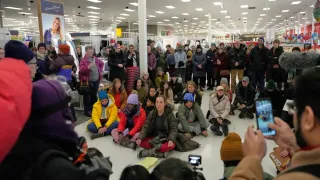May 4, 2024
Grindr Hit With Big Lawsuit After Sharing Users' HIV Status With Ad Firms
Emell Adolphus READ TIME: 2 MIN.
Grindr is has got itself in big trouble by allegedly sharing the HIV statuses of its users, according to a recently filed lawsuit brought by UK-based law firm Austen Hays.
As reported by Guardian, the gay hookup app is alleged to have breached British data protection laws by sharing the personal information of its app users.
According to the lawsuit, the app exposed and misused the personal information of thousands of users, and so far 670 people have signed up as a plaintive in the class action lawsuit that is expected to add "thousands" more.
"Grindr owes it to the LGBTQ+ community it serves to compensate those whose data has been compromised and have suffered distress as a result, and to ensure all its users are safe while using the app, wherever they are, without fear that their data might be shared with third parties," said Austen Hays in a statement.
In a retort, Grindr said the lawsuit has used the apps previous policies to create a "mischaracterization" how the app currently uses user data.
"We are committed to protecting our users' data and complying with all applicable data privacy regulations, including in the UK," said a Grindr spokesperson. "We are proud of our global privacy program and take privacy extremely seriously. We intend to respond vigorously to this claim, which appears to be based on a mischaracterization of practices from more than four years ago, prior to early 2020."
Founded in 2009, Grindr has become the world's largest dating app for gay, bi, trans and queer people, claiming to have millions of users around the world. The breach of data lawsuit will focus on a period before April 3, 2018, and May 25, 2018, to April 7, 2020, when the app changed its consent guidelines.
In 2018, Grindr announced it would stop sharing users' HIV status with third-party companies in April 2018 after a report by Norwegian researchers revealed the app shared data with two companies.
"In 2021 Norway's data protection authority fined Grindr 65m Norwegian krone (£4.8m) – 10% of its global revenues – for violating the General Data Protection Regulation, and the country's privacy appeals board upheld the decision last year," Guardian reports.
However, that decision did not focus on the sharing of HIV statuses.
"Our clients have experienced significant distress over their highly sensitive and private information being shared without their consent, and many have suffered feelings of fear, embarrassment and anxiety as a result," said Austen Hays managing director Chaya Hanoomanjee, who is leading the claim.
Would you be comfortable with Grindr sharing your personal information?






